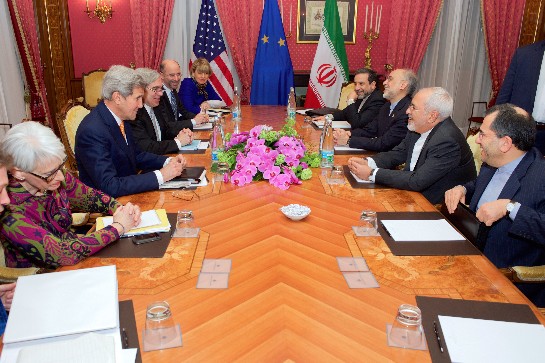 U.S. and Iran resume nuclear talks via State Department
U.S. and Iran resume nuclear talks via State Department
What to Expect From The Iran Nuclear Talks
Currently, talks are underway to prevent Iran from obtaining a nuclear weapon, in exchange for lifting internationally enforced economic sanctions. If Iran agrees to the conditions of a proposed agreement, certain sanctions will likely be removed, allowing Iran’s decimated economy to begin a recovery process.
Along with Iran, the key negotiators are the five permanent members of the U.N. Security Council: China, France, Russia, the United Kingdom and the United States plus Germany (otherwise known as the P5+1). As officials convened in Vienna this past Saturday, they have already determined that the original deadline of June 30 will be extended to July 9 . With Iran’s Foreign Minister Mohammad Javad Zarif making a quick trip back home to consult with the Supreme Leader and President Rouhani, the extension helps to ensure that the talks have the greatest chance of success.
If an agreement is reached, a timeline will likely be established outlining the lifting of international sanctions. Other details to consider will likely include the duration of the agreement, and the sort of conditions Iran must abide by in order to keep the agreement in effect. Possibly complicating matters, Supreme Leader Khamenei maintains that Tehran will only cooperate with the P5+1 if sanctions are immediately removed, but these lofty demands are contrary to Iranian public opinion as Iranians are eager to accept most conditions set forth in initiating normalization between Iran and the West.
With an agreement on the horizon, the P5+1 will have one particular benefit to look forward to. Curtailing Iran’s nuclear capabilities will dramatically alleviate the tension associated with the nuclear standoff between Iran and the West. This may serve as a precedent for improved relations between Iran and the international community.
At this critical point, it is vital that the Iranian government fully understand the benefits of ending its nuclear program. Iran can expect to see improvements in the backbone of their export earnings, but can also expect increased legitimacy throughout the international political sphere. With the conclusion of an agreement, Iran can hope to begin repairing the damage done to their oil industry as sanctions imposed by the international community affected domestic revenue by a loss of $26 billion. Additionally, by lifting these economic barriers, Iran may benefit from increased foreign investment throughout their oil and gas sectors. As long as Iran commits itself to upholding international norms, Tehran may gain the additional credibility that is necessary in establishing itself as a constructive world player.
Assuming the successful conclusion of an agreement, the U.S. will face another hurdle in the process: the final process of lifting or relaxing sanctions will be submitted to Congress, as they have 30 days to review and agree to the finalities of the Iran Nuclear talks. If the agreement assures an end to the Iranian nuclear threat, it will be hard for Congress to overlook the potential of this deal.





